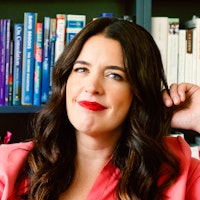
Americans are particularly convinced of a hyper-individualism, of a very intense pragmatism, and a deep belief that if they have a certain attitude that they can apply a formula to their life.
Show Notes
We try our whole lives to avoid pain and suffering and when it does show up, we try to solve it. In her new book, No Cure for Being Human, religious scholar Kate Bowler says we try to out-eat, out-learn, and out-perform our humanness. Truth is, bad things do happen to good people and if we're going to tell the truth, we need one another. As someone who lives with cancer, Bowler knows first-hand about the everything-works-out fantasy common in American culture. She speaks with Adelle Banks, national reporter at Religion News Service, about her personal experiences with pain and grief and the role religion plays in dealing with suffering.
This conversation was held by the Society of Fellows at the Aspen Institute. The Society of Fellows is a national community of diverse and distinguished leaders who sustain and support the Aspen Institute. Members enjoy unparalleled access to Institute programs and events, including unique experiences with nationally-recognized speakers. Join the Society of Fellows to advance the mission of the Aspen Institute.
Explore
Related episodes


So much of adult life is about learning the rules and then using those rules to navigate the world. We become certain that we know what we know — that we’re right, and we’re safer and more secure that way. But certainty, argues neuroscientist Beau Lotto, might actually be one of society’s biggest sources of emotional and physical unwellness. Certainty causes us to have les...


Are we experiencing a “crisis of connection"?” Fifty-four percent of American adults report that not a single person knows them well. Our political and social divisions are at the forefront of public life right now, and distrust is widespread. New York Times columnist David Brooks is on a mission to spread the skills of deep listening and engaged conversation, which lead t...


For many people, the COVID-19 pandemic lockdown became an unexpected opportunity to take stock of our relationships. Some friendships deepened and transformed, some slipped away, and many social circles shrank. Which isn’t always a bad thing.


People have been thinking about happiness for thousands of years. In fact, ancient thinkers came up with strategies for cultivating pleasures over a lifetime, or creating a lasting capacity to take joy in the world. This long-term flourishing is different from immediate pleasures — it’s a richer notion of happiness. Laurie Santos is a professor of psychology at Yale and an...







